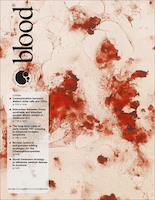
BLOOD
metrics 2024
Advancing the Science of Hematology.
Introduction
BLOOD, published by the American Society of Hematology, is a premier peer-reviewed journal in the fields of Biochemistry, Cell Biology, Hematology, and Immunology. With an impressive impact factor and ranking in the top quartiles (Q1) across multiple disciplines, BLOOD is essential reading for researchers and professionals seeking to stay updated on the latest advancements in hematology and related fields. The journal has been a cornerstone of hematological research since its inception in 1946, providing a platform for rigorous scientific inquiry and discourse. Its commitment to publishing high-quality original research, comprehensive reviews, and insightful editorials makes it a vital resource for students, practitioners, and scientists alike. By offering exceptional access to influential publications, BLOOD continues to shape the future of hematology and enhance understanding of blood-related disorders, marking its vital role in advancing both basic and clinical research.
Metrics 2024
 5.27
5.27 21.00
21.00 19.20
19.20 525
525Metrics History
Rank 2024
Scopus
IF (Web Of Science)
JCI (Web Of Science)
Quartile History
Similar Journals
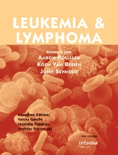
LEUKEMIA & LYMPHOMA
Elevating the standards of hematological research.LEUKEMIA & LYMPHOMA is a prestigious peer-reviewed journal published by Taylor & Francis Ltd, focusing on vital research in the fields of hematology, oncology, and cancer research. With an ISSN of 1042-8194 and an E-ISSN of 1029-2403, this journal is recognized for its high-quality and impactful contributions to understanding blood cancers, with a notable impact factor reflective of its influence. Since its inception in 1989, LEUKEMIA & LYMPHOMA has continuously provided a platform for researchers and professionals to disseminate their findings, fostering advancements in diagnostic, therapeutic, and clinical strategies related to leukemias and lymphomas. The journal ranks in the Q2 category for both Hematology and Oncology research categories as of 2023, underscoring its commitment to excellence. The journal is based in the United Kingdom and serves a global audience, making it an essential resource for those dedicated to improving outcomes for patients with hematological malignancies.

UHOD-Uluslararasi Hematoloji-Onkoloji Dergisi
Advancing knowledge in hematology and oncology.UHOD-Uluslararasi Hematoloji-Onkoloji Dergisi, published by AKAD DOKTORLAR YAYINEVI, is a pivotal journal in the fields of hematology and oncology, catering to an international audience of researchers, clinicians, and students. Since its inception in 2005, the journal has committed to disseminating high-quality, peer-reviewed research, highlighting advancements and challenges in the diagnosis and treatment of hematological and oncological disorders. Registered under ISSN 1306-133X, it serves as a significant platform for scholarly discourse, despite its recent categorization in the Q4 quartile for both hematology and oncology—indicating opportunities for growth and contribution within the scientific community. While currently not Open Access, the journal's indexed contribution to Scopus ranks it within the 12th and 17th percentiles in the domains of hematology and oncology respectively, reflecting its emerging presence within the academic landscape. As it approaches its convergence point in 2024, UHOD strives to elevate its influence, providing invaluable insights and fostering collaborations in the ongoing fight against blood disorders and cancer.

INTERNATIONAL JOURNAL OF HEMATOLOGY
Pioneering Discoveries in Hematological ScienceThe INTERNATIONAL JOURNAL OF HEMATOLOGY, published by SPRINGER JAPAN KK, serves as a critical platform for advancing research in the field of hematology. With a prestigious history spanning over three decades from 1991 to 2024, this journal is recognized for its impactful contributions, evidenced by its Q2 category ranking in Hematology for 2023, and its notable position at rank #71 out of 137 in the Scopus Medicine Hematology category. Researchers and professionals within the hematology community benefit from the journal's rigorous peer-reviewed articles that cover a wide range of topics, including clinical studies, basic research, and novel therapeutic strategies. Though currently non-open access, it provides essential insights and findings to an audience passionate about the latest advancements in blood disorders and treatments. Situated in Japan, the journal not only showcases high-quality research but also fosters a global exchange of knowledge in hematology, making it a significant resource for scholars, practitioners, and students alike.

Hemato
Pioneering Insights for Blood-Related DisciplinesHemato is a pioneering open-access journal dedicated to the field of hematology, published by the esteemed MDPI from its base in Basel, Switzerland. Launched in 2020, this journal aims to provide a platform for researchers, clinicians, and professionals to share significant findings and advancements in blood-related disciplines over a converged timeframe until 2024. With a commitment to disseminating high-quality research, Hemato seeks to foster collaboration and innovation in hematological studies, showcasing original articles, reviews, and clinical studies that contribute to expanding knowledge in this vital area. As an open-access journal, it promotes accessible scholarship, ensuring that groundbreaking research reaches a broad audience, thereby enhancing the impact on the global health community.
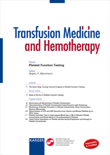
TRANSFUSION MEDICINE AND HEMOTHERAPY
Empowering innovation in hematology and transfusion medicine.TRANSFUSION MEDICINE AND HEMOTHERAPY, published by KARGER, is a prominent journal dedicated to advancing the fields of hematology and transfusion medicine. With an ISSN of 1660-3796 and E-ISSN 1660-3818, this esteemed journal has been a valuable resource for researchers and clinicians since its inception in 1973, with significant publication phases continuing into 2024. It currently holds a Q2 ranking in Hematology and a Q3 ranking in Immunology and Allergy, reflecting its impact and relevance in these critical fields. The journal features original articles, reviews, and clinical studies, presenting cutting-edge research that aids in the development of effective therapies and enhances patient care. Open access options are available, ensuring that crucial findings are accessible to a broad audience. As an important platform for dialogue and advancement in transfusion science, TRANSFUSION MEDICINE AND HEMOTHERAPY supports the global health community's efforts to improve treatment outcomes and foster innovation in medical practices.
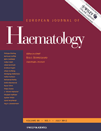
EUROPEAN JOURNAL OF HAEMATOLOGY
Pioneering Discoveries in Blood Disorders and TherapiesEUROPEAN JOURNAL OF HAEMATOLOGY, published by Wiley, serves as a vital resource for experts in the field of hematology, focusing on the latest advancements in blood disorders and therapies. With an ISSN of 0902-4441 and an E-ISSN of 1600-0609, this esteemed journal has been disseminating knowledge since 1986 and continues to thrive, converging its visionary approach through to 2024. Notably, it holds a distinguished Q2 ranking in Hematology and an impressive Q1 ranking in the broader category of Medicine (miscellaneous) as of 2023, highlighting its significant contribution to the scientific community. With a Scopus rank of #45/137 and a 67th percentile in the field, the journal is recognized for its rigorous peer-reviewed research, making it an indispensable publication for researchers, practitioners, and students aiming to stay at the forefront of hematological studies. Though not an open-access journal, it ensures broad accessibility to critical findings via its subscription model, thus fostering an informed and globally engaged audience.

BLOOD REVIEWS
Connecting professionals through cutting-edge research.BLOOD REVIEWS is a highly regarded journal published by Churchill Livingstone, specializing in the fields of Hematology and Oncology. With an impressive Q1 ranking in both disciplines and placing in the top 10% of its peer categories according to Scopus metrics, it provides an essential platform for the dissemination of cutting-edge research and reviews pertaining to blood disorders and cancer treatment. Since its inception in 1987 and continuing through 2024, the journal has established itself as a cornerstone for healthcare professionals, researchers, and students who seek to advance their understanding of hematologic and oncologic topics. While not an open-access journal, BLOOD REVIEWS retains a reputation for delivering high-quality, peer-reviewed articles that foster dialogue and innovation within the scientific community. For those in the United States and beyond, the journal serves as a vital resource, housed at the Journal Production Department in Edinburgh, Scotland, ensuring accessibility and a global reach in its critical academic contributions.

ANNALS OF HEMATOLOGY
Empowering the scientific community with quality contributions.ANNALS OF HEMATOLOGY, published by Springer in Germany, stands as a premier platform for advancing knowledge in the field of hematology and medicine at large. With a significant impact factor and recognized rankings—Q2 in Hematology and Q1 in Medicine (miscellaneous) as of 2023—this journal is pivotal for researchers, clinicians, and students who are keen on exploring the latest developments in blood disorders, treatments, and innovative methodologies. Its broad scope encompasses original research, reviews, and discussions that aim to foster interdisciplinary dialogue, ensuring that the latest findings and theories are accessible to the scientific community. Although not an open-access journal, its rigorous peer-review process guarantees high-quality contributions, thereby solidifying its reputation as a vital resource in the hematological field. Founded in 1991, the ANNALS OF HEMATOLOGY continues to evolve, converging invaluable insights from both basic and clinical research until 2024. For those dedicated to improving patient outcomes and advancing hematological science, this journal remains an essential reference.

Indian Journal of Hematology and Blood Transfusion
Empowering Healthcare Through Cutting-edge Hematology ResearchIndian Journal of Hematology and Blood Transfusion, published by SPRINGER INDIA, serves as a leading platform for disseminating original research, reviews, and case studies in the field of hematology. With an ISSN of 0971-4502 and E-ISSN 0974-0449, this journal has been instrumental in advancing knowledge from 2000 to 2024, providing insights into critical issues surrounding blood disorders and transfusion practices. Currently ranked in the Q3 category for Hematology for 2023, it reflects a commitment to high-quality scientific content amidst a competitive landscape where it ranks 97/137 in Scopus for Medicine - Hematology, placing it in the 29th percentile of its peers. The journal primarily addresses a diverse readership, including researchers, healthcare professionals, and students, aiming to foster innovation and collaboration within the field. Although it operates under a subscription model, access options for individual articles and institutional subscriptions ensure that valuable research is disseminated widely to enhance medical practice and education in hematology.
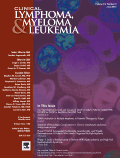
Clinical Lymphoma Myeloma & Leukemia
Illuminating the Path in Hematologic OncologyClinical Lymphoma Myeloma & Leukemia is a prestigious journal dedicated to the study and treatment of hematologic malignancies, offering a vital platform for researchers and healthcare professionals in the fields of oncology, hematology, and cancer research. Published by CIG MEDIA GROUP, LP, this journal has established itself as a crucial resource since its inception in 2010, with a continuous commitment to disseminating knowledge until at least 2024. With an impact factor that objectively reflects its influence, it is rated in Q3 quartiles in both Cancer Research and Hematology as well as in Oncology as of 2023. Researchers can access a wealth of articles and studies that explore various dimensions of lymphoma, myeloma, and leukemia, thus fostering an environment of collaboration and innovation. Although it currently does not offer full open access, its extensive archive and rigorous peer-review process ensure the publication of high-quality research, making it an essential resource for anyone dedicated to advancing the science and practice of treating blood cancers.